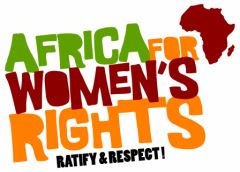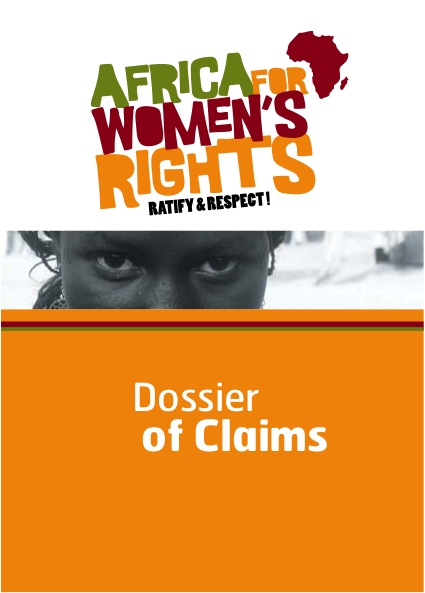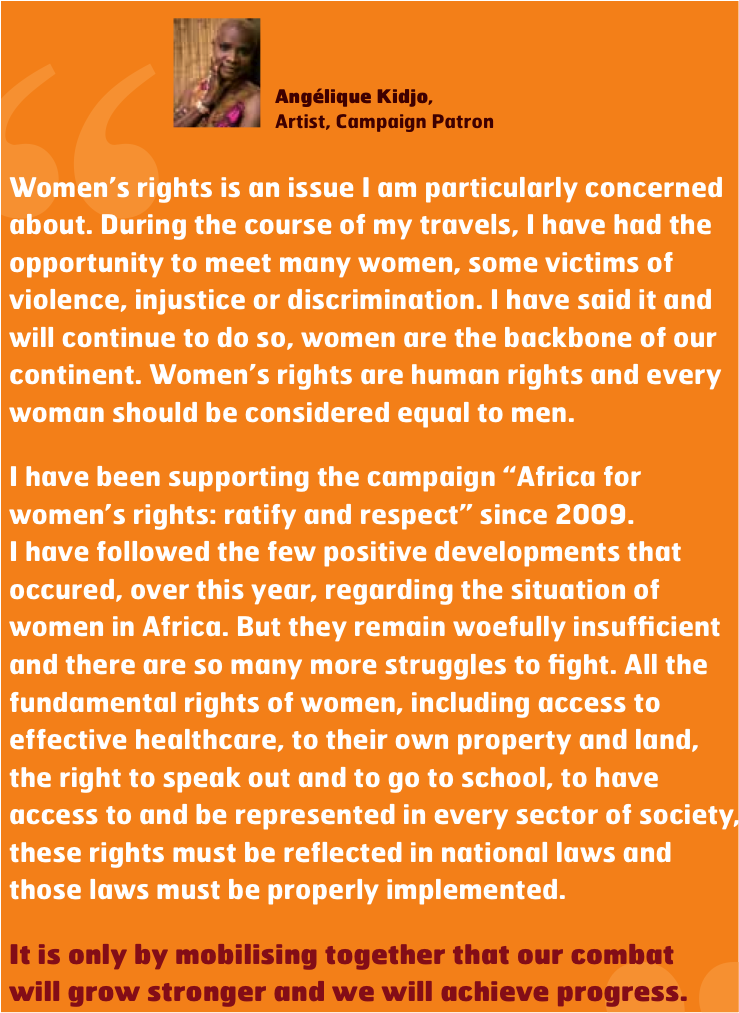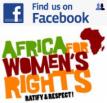The Campaign “Africa for women’s rights: ratify and respect!”
The Campaign “Africa for Women’s Rights: Ratify and respect!”
In the majority of countries in Africa, women continue to face discrimination, violence and violations of their fundamental freedoms. Although legislative progress has been achieved in some countries, discriminatory practices remain widespread across the continent.
Despite the ratification by most African states of international and regional instruments protecting the rights of women, such as the Convention on the Elimination of All Forms of Discrimination against Women (CEDAW), its Optional Protocol and the Protocol to the African Charter on Human and Peoples’ Rights on the Rights of Women in Africa (Maputo Protocol), their provisions are widely violated, due to legislative deficits or lack of adequate measures to enable their effective implementation.
On 8 March 2009, over one hundred organizations, present throughout the continent, launched the Campaign “Africa for Women’s Rights: Ratify and Respect!”.
This initiative aims to put an end to discrimination and violence against women in Africa, calling on states to ratify international and regional instruments protecting women’s rights, to repeal all discriminatory laws, to adopt laws protecting the rights of women and to take all necessary measures to ensure their effective implementation.

The Campaign calls upon all African governments to RATIFY the women’s rights protection instruments and to RESPECT them in law and practice.
The Campaign was launched at the initiative of the International Federation for Human Rights (FIDH), in collaboration with five non-governmental regional organisations: the African Center for Democracy and Human Rights Studies (ACDHRS), Femmes Africa Solidarité (FAS), Women’s Aid Collective (WACOL), Women in Law and Development in Africa (WILDAF) and Women and Law in Southern Africa (WLSA). These organisations make up the Steering Committee responsible for the coordination of the Campaign.
The Campaign has also received the support of Desmond Tutu, Nobel Peace Prize laureate 1984, Shirin Ebadi, Nobel Peace Prize laureate 2003, Nadine Gordimer, Nobel Prize in Literature 1991, Wole Soyinka, Nobel Prize in Literature 1986, artists Angelique Kidjo, Youssou N’Dour and Salif Keita, as well as Soyata Maiga, Special Rapporteur of the African Commission on Human and Peoples’ Rights on the Rights of Women in Africa and many others.
The Coalition of the Campaign stresses the urgency of the implementation and respect of the rights of women. Each and every violation of women’s human rights is a violation of the principle of the universality of human rights.

The Campaign “Dossier of Claims”
The Campaign Dossier of Claims, published in March 2010, is the outcome of investigations conducted by national human rights and women’s rights organizations in their respective countries and reflects the situation of women’s rights in over thirty African countries.
It contains key demands to eliminate discrimination and violence against women. These “claims” are directed towards national governments, since strengthening respect of women’s rights is primarily a question of political will. The Dossier is composed of a series of notes, detailing the main violations of women’s rights in each country. Each note underlines where they exist – any positive measures that have been taken over recent years, and identifies the main obstacles to respect of women’s rights in law and practice. In addition to its informative and awareness-raising functions, this Dossier constitutes an important advocacy tool at the disposal of all those involved in campaigning for women’s rights. The claims formulated in the Dossier will be brought to the attention of the competent authorities at the national, regional and international levels. The Dossier is also a tool for all those whose aim is to achieve full equality between men and women, an essential condition for the fulfillment of universal human rights. The Dossier is available on the wikigender website – LINK as well as on the campaign blog –Africa4Womensrights
The Campaign Blog

For further information, visit the Campaign blog: http://www.africa4womensrights.org
The blog, with information in English and French, is maintained by the organisations participating in the Campaign across Africa. You will find the Campaign Declaration, to be signed online, regularly updated information on women’s rights in Africa and details of the Campaign actions undertaken across Africa.




